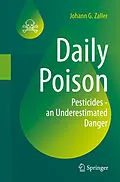This book is a sound science report about the consequences of pesticides to nature, health and environment.
The book shares essential insights into the use of pesticides in agriculture, discusses the politics, rhetoric and profits involved, addresses the potential health and ecological risks of pesticides in our daily lives, and debates possible solutions. Is agriculture without pesticides possible at all?
Moreover, the author gives insight into his scientific work, the set-up of the experiments, and also writes about his very own experiences with the media and press after publication of his studies.
For many years, Johann G. Zaller, an ecologist at the University of Natural Resources and Life Sciences in Vienna, and his team, have been researching applied chemicals and their effects on the environment. Their findings, together with relevant literature and media reports, are presented in this book, which offers a unique resource for anyone who wants toknow the nature and background of pesticides and how we come into contact with them in our daily lives.
Ever ate an apple? Read this book!
Autorentext
Johann G. Zaller is Associate Professor at the University of Natural Resources and Life Sciences in Vienna, Austria. He studied biology, botany and ecology at the Universities of Salzburg and Innsbruck in Austria. During his postgraduate research career he worked and studied in the United States, Argentina, Switzerland and Germany.
His research group at the University of Vienna investigates how environmental changes influence organisms and ecosystem functions. The group especially is interested in the effects of agricultural management measures (e.g. tillage, crop rotation, mowing, fertilising, pesticide applications) and the impacts of global changes (e.g. elevated atmospheric CO2, ultraviolet-B radiation, rainfall and temperature variations, invasive species).
Inhalt
Preface
What's the problem? Pesticides in everyday life
Agriculture in the pesticide treadmill
Pesticides are also used elsewhere
What substances are we talking about?
Loose approval and situation-elastic limits
War rhetoric sets the moodAgroecosystems also have a social benefit
What are the consequences for nature and humans?
From Silent Spring to own experiments
Earthworms become lazy and have fewer offspring
Tadpoles with crippled tails
Bees and bumblebees without orientation
Birds and bats starve to deathAgroecosystems loose their self regulation
Getting used to constant pesticide applications: resistances
The pesticide boomerang is already on its way back
Various side effects on humans
Does the use of pesticides pay off at all?
Critical scientists come on the internet pillory
Wheres is the solution to the problem?
Agriculture without pesticides, is that even possible?
How should the growing world population be fed?
Food waste promotes pesticide use
Agricultural subsidies to curb use of pesticides
Politics should decide and act on the basis of facts
Epilog
References
Acknowledgements
